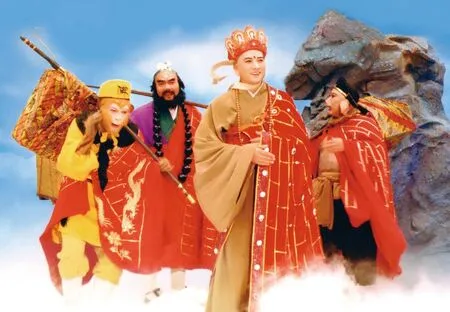Why Monsters Always Want to Steam Xuanzang for Eating
2017-08-03ByLiuShijiu
By Liu Shijiu
Why Monsters Always Want to Steam Xuanzang for Eating
By Liu Shijiu

In 1582, the tenth year of the Wanli emperor’s reign in China’s Ming Dynasty, Wu Cheng’en passed away, leaving behind many Da Vinci Code-like puzzles for later generations of Chinese people. These could even be called “The Wu Cheng’en Code.” The most important of all the enigmas being: “How should Xuanzang’s (a famous and fabled monk with impressive powers from the Chinese literary classic ‘Journey to the West’) meat be eaten?”
I went through the entire, ‘Journey to the West,’ and counted roughly fifteen times, from six different monsters and spirits, that clearly stated that Xuanzang’s meat should be steamed for eating. Let us try to unravel this mystery: “why would monsters and spirits steam Xuanzang’s meat when they catch him?”
Monsters and spirits yearn to eat steamed Xuanzang’s meat, considered to be the most precious of all foods on the pilgrimage to bring back the Buddhist scriptures. Xuanzang was a very enlightened individual himself, even he said his own flesh should be steamed and eaten. For instance, in the 27th chapter“The corpse fiend thrice tricks Tang Sanzang, another name of Xuanzang, the holy monk angrily dismisses the handsome Monkey King.” Xuanzang says, “My destiny is in Heaven’s hands, if the monsters and spirits are to steam me and eat me, or boil me, they will.”
So we can see, Xuanzang also thinks steaming is the first option, and boiling, whilst it is an option, is not as good as steaming.
The practicality of steaming Xuanzang was also recorded in “QímínYàoshù”.(a book on agriculture during 533-544 AD,written by Jia Sixie)
The eight volume “Qímín Yàoshù” lists as many as twenty-six different steamed dishes under the section“Steaming.” Apart from steamed lotus root, the rest of the dishes are all meat dishes: steamed bear, steamed pig, steamed chicken, and steamed goat…
The part cited about steamed bear says: “Take three sheng of pork, a bear, wash & skin clean and steam till half cooked. Next, add fermented soybeans and marinate overnight. Lastly, add glutinous rice, onion, ginger, and salt and put it in a rice steamer and steam till cooked.”
If bear can be steamed, Xuanzang shouldn’t be a problem.
Wu Cheng’en was born in Shanyang County of Huai’an, located in today’s Huai’an district of Huai’an City. It wasn’t until he was a fifty-something that he was finally selected as a “tribute candidate” by the local government to attend the imperial examinations. After two years of muddling around in Beijing he left for Zhejiang to be the official assistant officer of Changxing County and returned home shortly after. He lived out most of his life in southern China.
Yangzhou cuisine, now famous around the world, originated from the areas of Huai’an and Yangzhou. It is a cuisine that puts it emphasis on purity, mildness, and freshness. Broth steaming is the main form of cooking in Yangzhou cuisine. Wu Cheng’en’s taste was, obviously, deeply connected to his life.
Only steaming can keep the original flavors of top quality ingredients, achieving a sort of simple delight, allowing one to be lifted away with one bite. Xuanzang, a “chubby whitefaced monk,” “tender in appearance” is even more fresh and pure; evidently only through steaming can the highest realm of flavor be reached.
Some monsters and spirits suggested boiling Xuanzang, since it would save more fuel than steaming. Among the Leopard Spirit’s subordinate spirits arose the suggestion to boil Xuanzang, as it would lessen the amount of firewood needed.
The one who thought the same as this spirit was none other than Sun Wukong (The Monkey King, the most capable apprentice of Xuanzang).
In the 72nd chapter of ‘Journey to the West,’“The seven emotions confuse the basics in gossamer cave at filth-cleansing spring pig forgets himself,”seven spider spirits caught Xuanzang: “Sister, let’s have a bath before we steam the fat monk and eat him up.”“These monsters aren’t at all economical,” Monkey smiled to himself. “They’d save a lot of firewood if they boiled him. Why steam him instead?”
This kind of detail, actually casts a light on Wu Cheng’en’s normal everyday life. In ancient times, a city relied on a workman who provided firewood—normal citizens could only spend money to buy wood. The ancient phrase, “wood, rice, oil, salt, soy sauce, vinegar, tea” were considered as the seven necessities of life. With“firewood” being number one, it would certainly need to be rationed.
Spirits and monsters having the opportunity to get their hands on a top-notch ingredient like Xuanzang, in the face of destiny to eat an everlasting-life-giving piece of meat and still thinking about saving some firewood, is superficial and petty.

During the team of Leopard Spirits’ “brainstorm” on how to eat Xuanzang, one spirit said, “bring the Tang Priestout, chop him up into little bits, and fry him with anise seed. Then everyone will be able to eat a piece when he’s steaming hot, and we’ll all live forever.” At this another junior devil clapped his hands together and said, “No, no, he’d taste much better steamed.”
I believe this sentence was actually written because Mr. Wu Cheng’en couldn’t help himself anymore from jumping up and voicing his opinion. In a life of frustrated ambitions, it was the flavors of his home town and his scholarly interests that were engraved on to his heart, becoming the consolation that uttered from in between his lips and teeth.
It is established in “Journey to the West” that Xuanzang should be steamed for eating; this is the most basic of all common senses in the world of monsters and spirits. Any other cooking method is not a pursuit suitable for any monster or spirit.
(From Youth Digest Issue 16, 2016. Translated by Sam Bowden)

1582年,明神宗万历十年,吴承恩去世了。他用一部《西游记》,给后世中国人留下许多“达·芬奇密码”式的难解之谜,我们可以称之为“吴承恩密码”。而其中最为关键的一个问题是:“唐僧肉到底应该怎么吃?”
我粗略统计一下《西游记》全书,有6个妖怪曾15次明确地说,要把唐僧蒸了吃。我们就来试着解开这个谜题:“为什么妖怪抓到唐僧,都喜欢蒸了吃?”
不仅妖怪们喜欢蒸了唐僧吃,作为取经路上最珍贵的食材,唐僧自己也很有觉悟,觉得自己应该被蒸了吃。比如,在第27回《尸魔三戏唐三藏,圣僧恨逐美猴王》中,唐僧道:“我命在天,该那个妖精蒸了吃,就是煮了,也算不过。”
可见,唐僧自己也认为,蒸了吃是第一方案,煮了吃是不如蒸了吃的。
蒸唐僧的可行性,在《齐民要术》里有记载。
《齐民要术》第八卷中有“蒸法”,记载了多达26种蒸菜,除了蒸藕之外,全部是肉菜,比如蒸熊、蒸豚、蒸鸡、蒸羊……
没错,有蒸熊。其中引述的关于蒸熊的方法是这样的:“取猪肉三升、熊一头,洗剥干净,煮到半熟。然后,用豆豉腌制一晚上。接着,和糯米、葱、姜、盐一起,放到甑里蒸熟。”
连熊都可以蒸,唐三藏就更没问题了。
而吴承恩生于淮安府山阳县,也就是今天的淮安市淮安区。他一直到五十多岁,才补了一个贡生。吴承恩在北京混迹两年,之后到浙江做了长兴县丞,不久又回到老家。基本上,他是在南方度过大半生。
著名的淮扬菜,就发源于淮安、扬州一带。这个菜系注重鲜活,口味平和、清鲜。清蒸是淮扬菜的主要烹饪方法之一。吴承恩的口味,显然跟他的生活息息相关。
只有蒸,才能保持顶级食材本来的“鲜肥”之味,得“天真”之趣,可以一口入魂。而唐僧作为一个“白面胖和尚”,“生得娇嫩”,又是鲜活,显然蒸才能达到最高境界。
也有妖怪提议,把唐僧煮了吃,煮的好处是比蒸节省燃料。豹子精手下的小妖中,就有一个提议不如煮,省柴。


跟这个小妖有相同看法的,还有孙悟空。
在《西游记》第72回《盘丝洞七情迷本,濯垢泉八戒忘形》中,七个蜘蛛精抓住唐僧:“后边的走向前来呼道:‘姐姐,我们洗了澡,来蒸那胖和尚吃去。’行者暗笑道:‘这怪物好没算计。煮还省些柴,怎么要蒸了吃?’”
这样一个细节,其实也是吴承恩日常生活的映照。在古代,城市的柴火,需要靠专门的打柴人供应,普通人家只能花钱买柴。所以,古语“柴米油盐酱醋茶”为“开门七件事”,柴居第一位,需要节省。
作为一个妖怪,如果得到唐僧这样的顶级食材,在吃一块肉就要长生不老的命运面前,还想着省柴,实在是没有格局,成不了大器。
豹子精团队“头脑风暴”,讨论怎么吃唐僧的时候,一个小妖说:“把唐僧拿出来,碎碎剁,把些大料煎了,香喷喷的大家吃一块儿,也得个延年长寿。”又一个小妖拍着手道:“莫说莫说,还是蒸了吃得有味。”
这句话我认为,其实是吴承恩老先生自己忍不住,跳出来发表的意见。他不得志的一生中,家乡风味和文人趣味铭刻在心里,成为唇齿之间的安慰。
于是,在《西游记》的设定里,唐僧应该蒸了吃,是妖界的基本共识。别的吃法,都不是一个有追求的妖怪应该有的。
(摘自《青年博览》 2016年第16期)
为何非要蒸唐僧
文|刘十九
